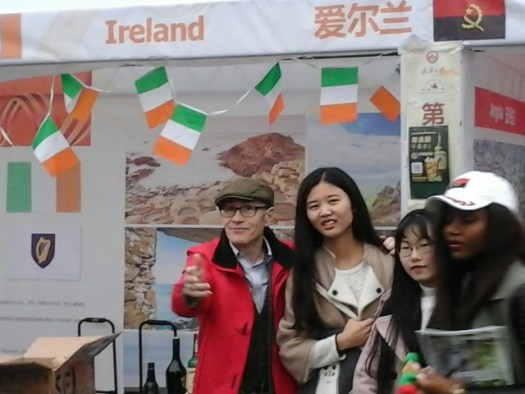

AITECE teacher Garreth Byrne says:
Anybody who travels around cities in China quickly experiences overcrowded the buses and trains. The shopping streets and popular markets are always bustling, especially at weekends. If you bump into somebody you learn to say ‘Dubuchi’ the word for sorry, which also means ‘excuse me’ whenever you want to ask a stranger for directions. A Chinese street or railway station escalator is the wrong place to linger as you talk fixedly into a mobile phone – but it happens all the time and people bump into each other and automatically blurt out ‘Dubuchi’.
Civility is so important when you board a city bus and deposit the standard one or two-yuan fare into a box beside the driver’s seat before proceeding along the aisle in search of a seat. On busy routes at peak times it is often impossible to find a seat. You have to shuffle along and hope that several passengers will get out through the middle or rear doors at intermediate stops. You hang onto an overhead strap bracing yourself for sudden stops at junctions, keeping your eyes peeled for passengers getting ready to vacate their seats.
Sometimes passengers of student age on an overcrowded bus have seen me shuffle slowly along the crowded aisle and have risen from their seats, beckoning me to sit down as they motioned to grip a hanging strap. They were eager to defer to a ‘laoshe’ or teacher and a foreign teacher in particular. If my intended trip was only for three or four stages and I didn’t feel stress, I often smiled and said ‘sheshe meio’ meaning that I was ok standing and they could sit it out. Ah, but there were the tired late afternoons, in hot weather or in sub-zero winter, when I accepted such kind offers, at the beginning of rattly trips that wound their way through thick traffic along straight and winding streets until they reached the university terminal half an hour later. In such cases I always hoped that the polite young person would find another empty seat after a couple of stage stops.
I never accepted the offer of a seat from a working man, an elderly person or a middle-aged woman who might be a busy mother. Their health took precedent over my weiguoren (foreigner) passing discomfort. If a mother with child came towards me on an overcrowded vehicle my natural instinct was to rise and let them sit. We in Ireland don’t seem to experience such situations because city bus drivers monitor the seating capacity and tell surplus passengers to wait until the next bus. In China, bus company policy is to pack them in tightly and make more money.
There is much civility on crowded city buses in China, but there are lurking pickpockets too. Other passengers have told me to beware, and I have secured my cash and credit cards safely away from prying hands. Be securely civil.
It’s good to get a bus seat in cold weather. This bus leaving a university terminal in Changchun will wind slowly downtown through freezing slush.










 .
.








